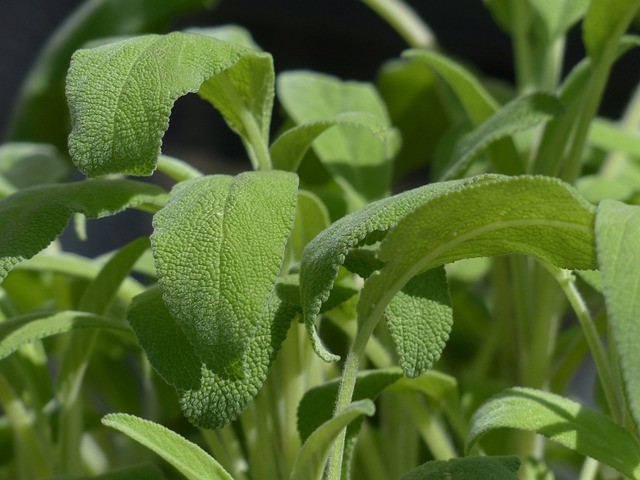Learn what will happen to your body if you consume sage. Check out the article we found over at Healthy and Natural World.
Not many plants and herbs managed to capture the hearts of people around the globe as well as sage. Used for centuries for its sweet savory taste and medicinal properties, sage first conquered the Mediterranean region and gradually found its place in homes around the world. The plant’s scientific name already says a lot – Salvia, which translates from Latin as ‘to be saved’ or ‘to cure’.
Sage – Health Benefits
Here’s a collection of all the wonderful things sage can do:
1. Sage as Alzheimer’s disease treatment
Some exciting developments are also under way in the area of Alzheimer’s research. A clinical trial published in the Journal of Clinical Pharmacology and Therapeutics showed that patients with mild to moderate forms of the disease improved their cognitive skills and experienced less agitation after taking sage for four months.
Scientists explain that sage’s positive effects on the brain probably have to do with a combination of chemicals that also inhibit an enzyme called acetylcholinesterase (AChE), which disturbs neurotransmitters’ function in patients with Alzheimer’s. Further studies are expected to establish how sage could contribute to the development of Alzheimer’s medications, which currently cause a lot of unwanted side effects.
2. Sage has antioxidant and anti-inflammatory actions
Sage contains many anti-inflammatory and antioxidant compounds. It has been suggested that people who suffer from inflammatory conditions, including arthritis and asthma, should increase their sage intake.
Like rosemary, sage too contains rosmarinic acid, which gets easily absorbed and controls the body’s inflammatory response. In conjunction with that, the plant’s leaves and stem also abound in antioxidant enzymes, which prevent oxidative stress that can result in many chronic diseases, including cancer.
3. Sage and liver health
Some animal studies showed that sage’s antioxidants can support liver health. When sage tea was given instead of water, antioxidant levels in the liver increased, as reported in the study published in theJournal of Ethnopharmacology in 2005. In addition, a study from 2007 also found that sage prevented depletion of glutathione, an important liver antioxidant, by 62% in the studied animals.
There is a lack of human studies, however, and some warn of the sage’s unclear effect on the liver. A study from 2007, published in Food and Chemical Toxicology, reported that sage tea may increase the carbon tetrachloride-mediated toxicity of the liver in laboratory animals, which could be potentially dangerous. Therefore, the use of sage tea for liver health should always be consulted with a doctor to establish the safety of taking it.
Precautions and safety notices
To make sure sage doesn’t interact with your existing medication or have a negative effect on you, you should always consult your doctor if you have a health condition and you are considering taking sage supplement.
WebMD lists the following precautions:
- Due to sage containing a chemical called thujone, it shouldn’t be taken by pregnant and breastfeeding women. In large doses, thujone can be toxic and cause a miscarriage, as well as reduce milk supply.
- People who have diabetes should carefully monitor their sugar levels.
- Spanish salvia, a species of sage, should not be taken if you have a condition that can be made worse by exposure to estrogen hormone, or you have either high or low blood pressure.
- Sage should not be used before a surgery, as it might interfere with blood sugar control.
- Don’t take sage if you suffer from seizures – the chemical thujone can trigger an episode.
How much sage to consume
Sage is available as a fresh or dries herb, liquid tincture, an extract, capsules, essential oil and tea. Livestrong website talks about sage tea and recommends to consult your doctor before you decide to begin drinking sage tea on a regular basis, as the amount of sage tea you need to drink daily may depend on your health, age or weight. It is mentioned there to prepare sage tea by steeping 1 to 3 g of dried sage in 1 cup of boiling water, and adults can consume up to 3 cups of this medicinal tea each day, according to the University of Pittsburgh Medical Center.
WebMD website mentions that for treating Alzheimer’s disease dosage is 1 gram of sage per day. It also mentions that a dose of sage extract, gradually increased over time to 2.5 mg three times daily, has also been used.
Sage is also a common ingredient in natural toothpaste due to its excellent antiseptic and antibacterial properties, and is known to treat oral infections, gingivitis and sore gums.
Next Article: Top 10 Herbs That Heal
Read full article: What Happens to Your Body When You Consume Sage







Rose Mountain Doolan
Oct 09. 2015
why is it so much talking and before we get the answer money is asked for
Geoffrey Harris
Oct 10. 2015
Infomercials are a pain. Ok. I used it for chicken.
Malkiat Bhullar
Nov 12. 2017
Good